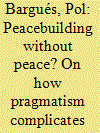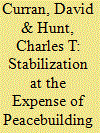|
|
|
Sort Order |
|
|
|
Items / Page
|
|
|
|
|
|
|
| Srl | Item |
| 1 |
ID:
193896


|
|
|
|
|
| Summary/Abstract |
The study aimed to determine the estimated cost of positive peace (CoPP) that countries make in their key institutions or the main contributors to maintaining and sustaining peace. Using a system, structure, and attitude approach and the latest globally available data on countries’ spending on the military, judiciary, law enforcement agencies, and education, CoPP is estimated. The study found an estimated average CoPP of US$ 1,693 billion or US$ 1,244 per capita per annum in 55 sampled countries for 2015. The analysis further suggests that there are two main categories of costs: a) costs of maintaining positive peace, and b) costs of sustaining positive peace. The study found that the countries with a higher level of positive peace invest more in sustaining peace which decreases with the decline in positive peace. In contrast, the countries with a lower level of positive peace invest more in maintaining peace which decreases with the increase in positive peace. The findings also show that countries governing the welfare state model, tend to be more peaceful, with a higher share in sustaining peace. Similarly, cultural, ethnic, and social homogeneity is found to be contributing factors to shaping positive societal attitudes, though further investigations are required.
|
|
|
|
|
|
|
|
|
|
|
|
|
|
|
|
| 2 |
ID:
171920


|
|
|
|
|
| Summary/Abstract |
The International Relations (IR) literature has strongly criticised the invasive and top-down nature of liberal peace, facilitating a reinterpretation of the practice of international intervention in conflict-affected societies. Today, sustaining peace policy approaches advance longer-term missions, give a secondary role to external practitioners, and increasingly accept risks and failures. What is striking is that even when these policy discourses hold out the promise of liberating peacebuilding from dominant and top-down models of liberal intervention, the mood in the field is one of despair. By drawing on John Dewey's work on pragmatism and interviewing practitioners in Bosnia and Kosovo, the article reflects on the morass practitioners find themselves, diagnoses the source of the frustrations, and anticipates the direction of sustaining peace. Pragmatism adumbrates the idea of ‘peacebuilding without peace’, encouraging practitioners to experiment, give primacy to their doings and explore this world without hope of success and dreams of otherworldliness.
|
|
|
|
|
|
|
|
|
|
|
|
|
|
|
|
| 3 |
ID:
171076


|
|
|
|
|
| Summary/Abstract |
The “uploading” of stabilization to UN peacekeeping presents conceptual, political, and practical challenges to the UN’s role in global governance and international conflict management. While scholarly research on stabilization has generally focused on militarization, its relationship to peacebuilding in the context of UN peacekeeping is underexplored. This article examines that relationship. A survey of UN policy frameworks highlights the simultaneous emergence of stabilization and clear expressions of peacebuilding. The article then draws on fieldwork in Mali and the Democratic Republic of Congo to illustrate how stabilization is displacing peacebuilding in the practices of UN peacekeeping. The article argues that the politics of stabilization impede local forms of peacebuilding, at odds with the “Sustaining Peace” agenda, and risks jeopardizing the lauded conflict resolution potential of UN peacekeeping.
|
|
|
|
|
|
|
|
|
|
|
|
|
|
|
|
|
|
|
|
|